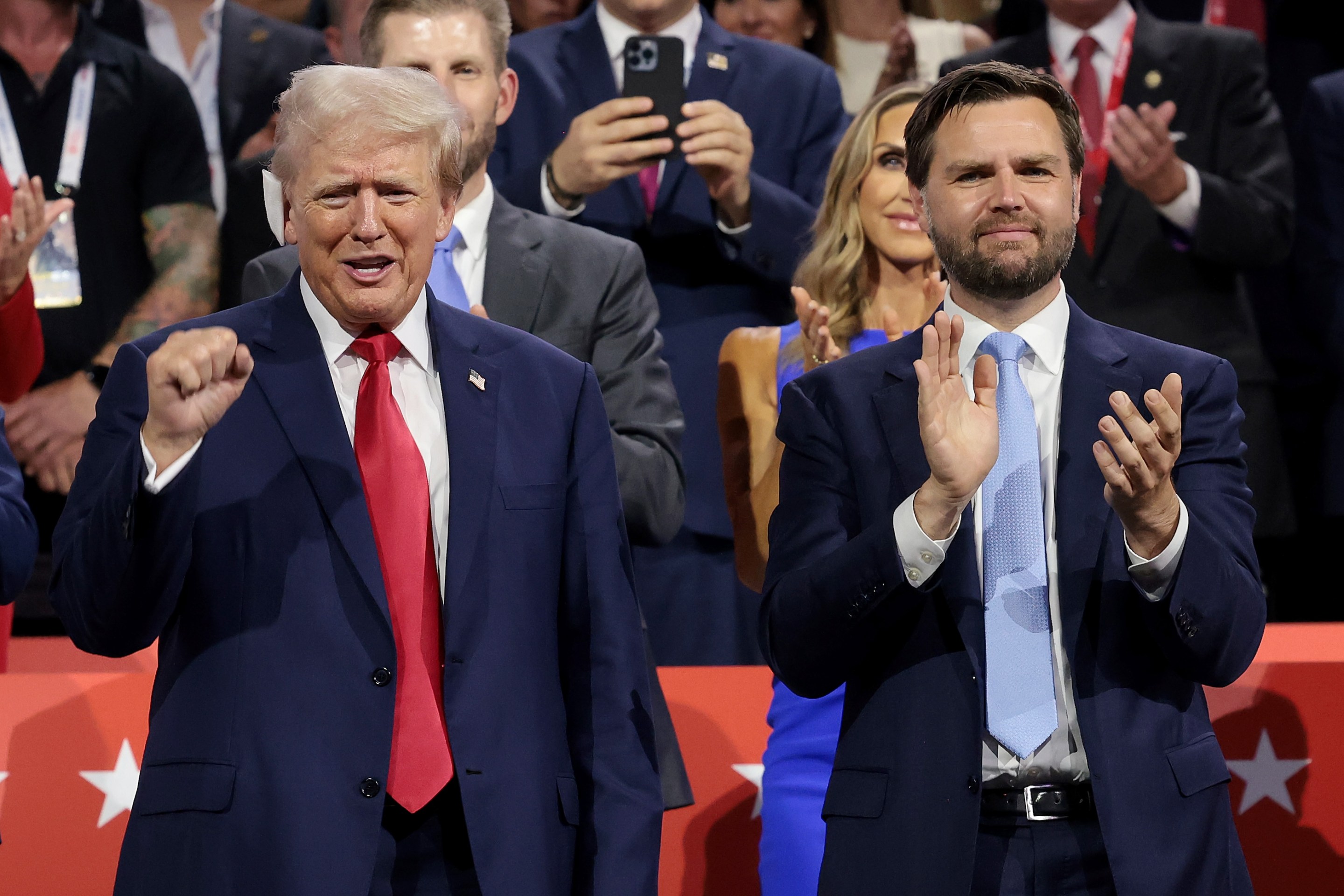At the most basic level, there is just no percentage in trying to parse a political campaign's decision to try to incite a pogrom. It does a favor to the people doing it, for one thing, because even assessing it along the lines of any other campaign decision provides a cosmetic coat of reason to something that hasn't earned it. More than that, there's no sense in searching for a justification when the people involved know that they are doing something that can't be justified. That is more or less why they're doing it, and any supposed tactical advantage should be understood as secondary to the primary purpose, which is to see what they can get away with, and to begin seeking permission in earnest for something that is (probably) still impermissible.
There was surely some calculation in J.D. Vance's decision last week to elevate the entirely unsubstantiated claim of Haitian immigrants killing and eating their neighbors' pets in Springfield, Ohio. There is an adjacent calculation in his decision to continue doing so even after the woman behind the initial Facebook post making that claim repudiated it; there is a great deal of Psychology in Vance himself saying, on Sunday, that his decision to repeat and repeat and repeat this lie was a reflection of his willingness "to create stories so that the American media actually pays attention to the suffering of the American people." Vance also noted that "the media totally ignored this stuff until Donald Trump and I started talking about cat memes." That conflation of the lurid threat that the Trump campaign conjured out of nothing—to real people, in a community that Vance notionally represents as an Ohio Senator—with those Hang In There Kitty posters is easily the boldest part of this cowardly and rancid campaign. Probably the most novel, too: Rich as it is in pogroms, and pogroms incited by and justified by similarly stupid, similarly obvious viral lies, American history had not previously provided an instance in which the most powerful proponents sought to pre-disclaim their responsibility through vigorous use of the classic cry-laughing ROFL emoji.

Nothing about Vance is really very mysterious, even relative to the other clammy aspiring genocidaires in the Trump movement; he, like everyone else that has fallen into formation behind Trump, is betting on the hope that, through him, they might get away with the same things that Trump has always gotten away with, and get more of whatever they want without having to pay for it. Whoever they were or whatever else they wanted before they made that decision is made irrelevant as a result of their having made it. Whether it's a gag or a gambit, the choice can't really be excused. It explains itself.
This one was a gambit. Vance and the campaign saw a story gaining momentum in reactionary spaces on social media and bet that amplifying this particular lie—and Vance acknowledged last week that "it's possible, of course, that all of these rumors will turn out to be false"—might work for him. That is, it might get and keep enough people scared and angry enough to support the only fully articulated policy position of the Trump campaign, which is a bloody campaign of domestic warfare against the enemies of Trumpism writ large, and more specifically against the neighbors you personally dislike. Trump is not a big believer in consequences, but has a capacious and lazily brutal affinity for vengeance; he lives, fuming and dead fucking serious, within the Mel Brooks joke that "tragedy is when I cut my finger, comedy is when you fall into an open sewer and die." Vance, teacher's pet that he is, did not take this incitement very seriously, either. Not in terms of the consequences it might have—Springfield's schools and city government and hospitals have, quite predictably, been shut down by repeated threats of violence since Trump repeatedly mentioned this in front of 67 million viewers during last week's debate, and the Haitian community has been terrorized by people who believe they have been granted a hunting license by the 45th President of the United States—but also not in any deeper sense, either. For Vance, it was just some new sound to make, to see if some other people might make it back at him. Some of them have.

The motivation of the parties that used this lie before Vance did, and who made it big enough in some diseased online spaces that it appeared useful to him—a neo-Nazi group seeking to leverage tensions in Springfield for neo-Nazi reasons; the Twitter accounts that exist expressly to provide new targets for bomb threats to the platform's bomb threat–making community; hordes of fascist dorks and hair-trigger mee-maws—is not very difficult to figure, either. They are just making sounds, too, but they are a little plainer about what they want, which is to get some other people hurt and get away with it. Again, you don't need to know why someone does something like this, really. The mere act of doing it tells you everything that you need to know about them.
There is a sort of basic bully's instinct undergirding it all, a calculation that seems less about political appeal—and this sort of full-spectrum ugliness hasn't really worked for Trumpists in national elections—and more about an innate understanding of what they can get away with, and which people are easiest and cheapest to hurt. It's the recognition of an asymmetry between how luridly dishonest even a top-of-the-ticket national candidate can be and how direct the media will or won't be about saying that they are lying. There is no basis for defending this kind of gutter-racist Facebook gossip bullshit on the merits, but Republicans have correctly identified that the people in charge of pointing out that it is gutter-racist Facebook gossip bullshit will keep on bringing a "what appear to be misleading remarks"–style fustiness to an old-fashioned lie fight.
"Even as he acknowledged the possibility that the rumors might be false, Mr. Vance encouraged his supporters to go on spreading them," the New York Times wrote last Tuesday, in a story headlined "J.D. Vance Appears To Backtrack On False Claim About Haitian Immigrants In Ohio." An institution as self-serious as the Times is uniquely poorly suited to cover this sort of memetic politics. "Their over-the-top imagery gives them the feel of an inside joke," the paper explained last week, in a post about the right's meme sortie. "A 'just kidding' is implied, allowing political figures who might otherwise have hesitated to circulate debunked material to get in on it." This crucially misreads the ROFL emoji. The purpose of which in this case is not to indicate that the poster doesn't really believe in these lies, but that they don't care.
It was not surprising that Donald Trump would bring the story up during the debate, and not just because nothing that Trump does is ever surprising. By then, Trump had surely seen the story on television, and therefore believed it was both important and true. Repeating whatever odious lie he just heard on television back to an audience that's grown brutal from that fare has always been his big play; a man whose signal ambition was always to be on television is now not merely on it but trapped, suffocating, within it. When one of that debate's moderators pointed out that there is no evidence of the claim, that it was denied by Springfield's city manager and police department, Trump seemed confused and affronted. "Well I've seen people on television," he insisted. "The people on television are saying my dog was taken and used for food."
Again, though, Donald Trump is one of the most thoroughly known quantities in American life; the country has been stuck in here with him for nearly a decade now. Everyone knows that there is nothing he would not say, simply because he believes that he can say whatever he wants; everyone knows that once he starts saying something, he will never stop saying it, and will in fact say it louder and make it bigger, because to do anything else would be not merely admitting error but, given how over-leveraged his whole being is on the issue of his own invincibility, something like death. Seeding the belief that undocumented immigrants will vote against him in the coming presidential election is very much something Trump would say, whether as an early excuse for losing, or as a sop to various longstanding reactionary fantasies, or as advance justification for some subsequent attempts to bring those fantasies to life. But also like most things he says, it is a sound he makes because he noticed that people responded to it. He is a boring, stupid man, a bigot and a liar, and so will only ever do the boring, stupid things he does for the most boring, stupid reasons.
Which leaves us with this: One of the two biggest political parties in the country, the one that controls the highest courts, has as a decent-sized and growing segment of its base people who like to make bomb threats. The party as a whole lives within a prolonged and deranging fantasy of political violence, and offers its base nothing but the license to further lavish over those fantasies, as well as the teasing possibility that they will someday be permitted to make them real. Last Friday, at a rally, Trump said that he would deport Springfield's Haitian community, which is living and working in this country legally, en masse, to Venezuela. All of these people are unserious and behave unseriously, but it would be foolish to assume they don't mean it.
That is it. The tide rushes out on everything else, every other idea that the conservative movement (never very convincingly) pretended to have, and leaves this behind. The actual beliefs are self-evident: that the suffering of others is a tool, or a toy; that everyone else in the world is a threat or an obstacle or something to wad up and throw away; that even the most abstracted inconveniencing of their own sainted comfort is tantamount to the end of the world. A cohort of the most fearful and most credulous and most idly vicious people this country has ever produced, who have lately awakened to some strange and terrible appetites and whose only real faith is in their own unshameable blamelessness, watches to see what will happen next. This is what the lie is for—to freeze this uneasy moment in place and hold it there forever, a threat unspooling endlessly over the horizon, not so much into the future as instead of it.





